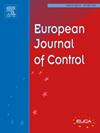具有混合延迟和欺骗攻击的高度非线性混合随机系统的动态事件触发控制
IF 2.6
3区 计算机科学
Q2 AUTOMATION & CONTROL SYSTEMS
引用次数: 0
摘要
研究了具有混合时滞的高度非线性混合随机系统的事件触发控制问题。其主要目标是在保持通信资源的同时稳定随机系统。为了实现这一目标,采用了基于非周期采样机制的动态事件触发控制策略,并解决了信号传输过程中的传输延迟和欺骗攻击两种网络现象。在非线性系数满足多项式增长条件的前提下,分析了全局解的存在唯一性。利用Lyapunov稳定性理论和m矩阵技术,给出了控制随机系统的理想的p阶渐近稳定和p阶指数稳定的充分判据。最后,通过数值算例验证了所提理论结果的可行性。本文章由计算机程序翻译,如有差异,请以英文原文为准。
Dynamic event-triggered control for highly nonlinear hybrid stochastic systems with mixed delays and deception attacks
This paper addresses the issue of event-triggered control for highly nonlinear hybrid stochastic systems with mixed delays. The main objective is to stabilize the stochastic systems while conserving communication resources. To achieve this aim, a dynamic event-triggered control strategy based on the aperiodic sampling mechanism is employed and two network phenomena during signal transmission including transmission delay and deception attacks are addressed. The existence and uniqueness of the global solution are analyzed under the assumption that the nonlinear coefficients satisfy the polynomial growth condition. By utilizing the Lyapunov stability theory and the -matrix technique, sufficient criteria are proposed to ensure the desired th moment asymptotic stability and th moment exponential stability of the controlled stochastic systems. Finally, a numerical example is given in order to verify the possibility of the proposed theoretical results.
求助全文
通过发布文献求助,成功后即可免费获取论文全文。
去求助
来源期刊

European Journal of Control
工程技术-自动化与控制系统
CiteScore
5.80
自引率
5.90%
发文量
131
审稿时长
1 months
期刊介绍:
The European Control Association (EUCA) has among its objectives to promote the development of the discipline. Apart from the European Control Conferences, the European Journal of Control is the Association''s main channel for the dissemination of important contributions in the field.
The aim of the Journal is to publish high quality papers on the theory and practice of control and systems engineering.
The scope of the Journal will be wide and cover all aspects of the discipline including methodologies, techniques and applications.
Research in control and systems engineering is necessary to develop new concepts and tools which enhance our understanding and improve our ability to design and implement high performance control systems. Submitted papers should stress the practical motivations and relevance of their results.
The design and implementation of a successful control system requires the use of a range of techniques:
Modelling
Robustness Analysis
Identification
Optimization
Control Law Design
Numerical analysis
Fault Detection, and so on.
 求助内容:
求助内容: 应助结果提醒方式:
应助结果提醒方式:


